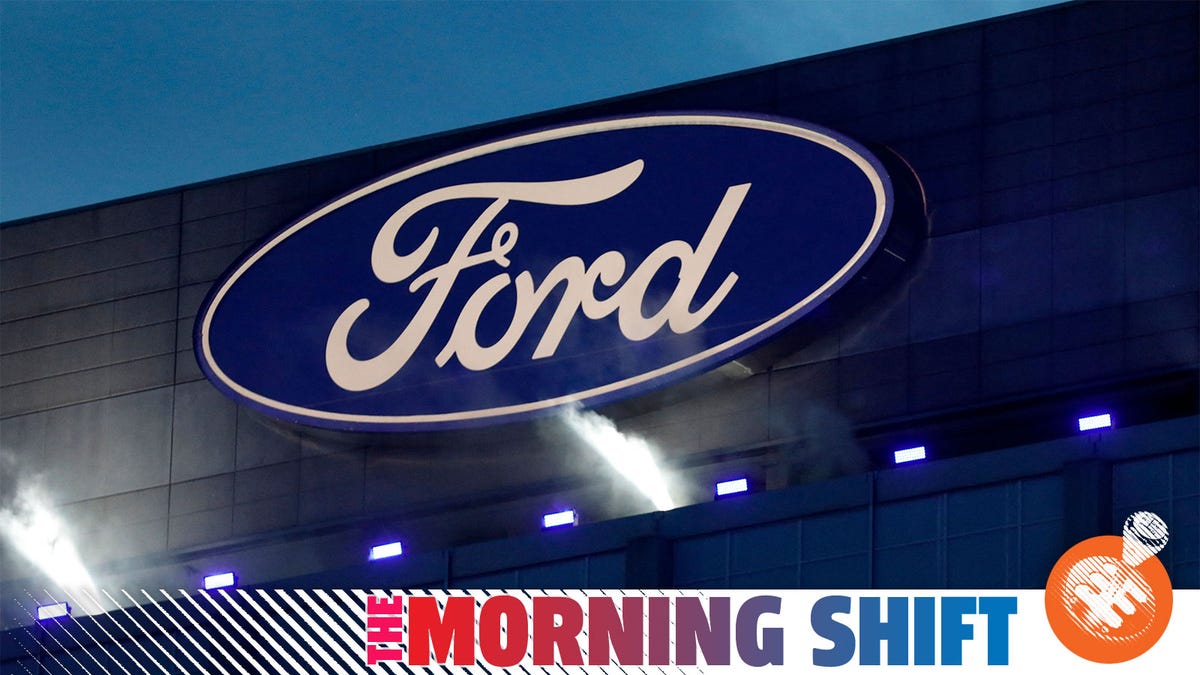Ford Ordered to Pay $1.7B Over Deadly Georgia Crash

Photo: Jeff Kowalsky / AFP (Getty Images)
Ford has been ordered to pay $1.7 billion in damages over a 2014 crash that killed two people, Hyundai is bringing forward its plans to open an EV plant in the U.S. and Porsche says it wants to make a boat load of electric Macans. All that and more in The Morning Shift for August 22, 2022.
01:50
BAD_How the 2022 Ford Bronco Raptor Drives On-Road and Off
Friday 6:42PM
1st Gear: Ford Hit With $1.7 Billion Fine
A jury panel has ordered Ford to pay more than $1.7 billion in damages over a crash in Georgia that killed a couple. In 2014, Melvin and Voncile Hill were driving a 2002 Ford F-250 pickup when a tire burst and the truck flipped over and crushed them, according to Automotive News.
Following the crash, the couple’s family claimed that “Ford knew the roofs of the F-250 pickups was too flimsy to protect riders in the event of a roll-over.”
The family has now won its court case against the Blue Oval and its handling of the crash. Following a 14-day trial in state court in Lawrenceville, GA, a jury awarded the family in compensatory damages and allocated “70 percent of the blame to Ford.”
G/O Media may get a commission

Year-round basics
Uniqlo Summer Sale
Basics you don’t wanna miss
Uniqlo’s summer sales are not to be missed. The whole sale is killer to stock up on the basics Uniqlo is known for—subtle colors, classic silhouettes, and a dress up-or-down vibe.
The following day, the court ordered Ford to pay $1.7 billion in punitive damages. In the state of Georgia, these fines are divided between the state, the family and its lawyers.
Gerald Davidson, the family’s attorney, said: “We are very, very happy for the Hill family and very happy for the advancement of automobile safety.”
According to The Wall Street Journal, a Ford spokesperson said the automaker plans to appeal the decision. They said that “while our sympathies go out to the Hill family, we don’t believe the verdict is supported by the evidence.”
The trial is the latest in a long line of dramas that are affecting Ford’s reputation for reliability. Over the past year, it has been hit with countless recalls of its EVs and gas-powered cars. The company is also facing two lawsuits over its handling of recalls relating to fires in engine bays on its SUVs and trucks.
2nd Gear: Hyundai Brings Forward U.S. EV Plant Plans
A week after analysts warned that changes to EV tax credits could reshape the electric car supply chain, Hyundai has announced that it plans to reshape the EV supply chain here in the U.S.
The move follows the news that the U.S. will change its tax credits for electric vehicles as part of the Inflation Reduction Act. The new rules cut out the limits on how many $7,500 tax breaks car makers can hand out, but add in the stipulation that they can only be awarded to cars assembled in the U.S.
With just 20 EVs left qualifying for the tax breaks, automakers whose cars no longer qualify are left fighting for factory space to begin assembling their models stateside. And that brings us onto Hyundai, which has announced that it might speed up its plans for a new plant in America in order to qualify for the incentives. According to Reuters:
“Hyundai Motor said in May that it would break ground on its new facility in Georgia in early 2023, with commercial production starting in the first half of 2025 with an annual capacity of 300,000 units.
“But the company is now considering starting construction later this year in order to begin commercial production in the second half of 2024, Yonhap reported, citing an unidentified auto industry source.”
Without a factory here in America, Hyundai’s electric models like the Ionic 5, do not qualify for incentives under the new regulation.
3rd Gear: Climate Change Could Derail EV Adoption
But despite the world’s automakers trying their hardest to encourage widespread EV adoption to try and curb CO2 emissions, it might be too little too late. According to Bloomberg, changes to the climate as a result of our emissions over the past 100 years are beginning to affect electric vehicle production.
A report from the site suggests that flooding, drought and extreme heat waves being experienced around the world are all having an impact on production of electric cars.
In China, Bloomberg reports that extreme heat is leading authorities to cut power supplies to factories, including lithium production facilities that are integral to EV construction. Volkswagen factories in China were affected by the power outages last week.
Meanwhile, in Europe, droughts have left waterways dried up and impassable. These rivers and canals were key transport routes for fuel for power stations, which could lead to similar outages across the bloc if supplies dry up. According to Bloomberg:
“While rainfall over the weekend alleviated risk of disruption to diesel and coal shipments to power stations and industrial plants, Shell already cut production at Germany’s biggest oil-processing complex due to the issue. And in the German states of Brandenburg and Saxony, where Tesla and BMW operate car factories, authorities had to ask the military for help fighting several forest fires this summer.”
These new issues aren’t replacing the supply chain problems caused by the pandemic and the war in Ukraine, they’re now piling on top of those challenges. And while firm’s like Tesla may be working to install wind farms or solar plants to power their factories, is that a bit like trying to fix a crack in a reservoir with a sticking plaster?
Maybe this perfect storm of problems is the signal the auto industry needed to bring about real change across the sector.
4th Gear: Hino Halts Shipments Over Emissions Cheating
Japanese truck and bus manufacturer Hino has been forced to suspend shipments of certain models over a data scandal. The Toyota-owned automaker will halt deliveries of small trucks after a “widespread data falsification scandal” was found to have affected such models.
The data scandal all relates to emission figures for Hino’s trucks. It first came to light in March this year, when the Toyota subsidiary admitted that “it had falsified diesel engine performance and fuel economy data for some of its vehicles manufactured in Japan.”
At the time, the scandal wasn’t thought to have impacted the company’s small trucks, but now it has expanded its investigation into the incident to include such models. According to Automotive News:
“Hino said in a statement that some 76,694 vehicles of its Dutro small truck model were impacted, bringing the total number of vehicles involved in the scandal to more than 640,000. The automaker said even though the engine for the small trucks was supposed to be tested at least two times at each measurement point, it only tested once at each site.”
“The latest shipment stoppage means that Hino will be pausing shipment of 60 percent of its vehicles for the year, a spokesperson said. It will continue to ship Dutro’s 1.5 T truck model since Toyota makes its engines, the spokesperson added. Hino sold just 187 units of the model in the 2021 financial year.”
The company has reportedly been cheating its emissions tests as far back as 2003, according to a company-commissioned panel.
5th Gear: Porsche Wants to Make Loads of Electric Macans
The all-electric Porsche Taycan has been a bit of a hit since it started making its way into the hands of customers. The company’s first all-electric model became its third best-selling model here in the U.S. in its first year, and in 2021 it sold almost as many Taycans as it did 911s.
Understandably, then, the company has high hopes for its next EV, which is thought to be a battery powered version of its Macan SUV. According to Reuters:
“Volkswagen’s sportscar brand Porsche expects to produce as many units of its Macan model in the electric version as the original with a combustion engine, production chief Albrecht Reimold told magazine Automobilwoche.
‘“We produce more than 80,000 units of today’s generation, and in the long term we also plan to produce as many of the all-electric Macan,’ Reimold was quoted as saying.”
As well as its Taycan coupe and wagon models, Porsche has ambitions to grow its portfolio of EVs.
Since 2019, there have been murmurs that the next Porsche Macan would offer electric and gas-powered drivetrains. The next-generation Macan is expected to premiere in 2023 or 2024.
After that, Porsche is planning to electrify its 718 sports car, and will create a larger electric SUV to sit at the pinnacle of its portfolio.
Reverse: Saved by the Citroen
Neutral: I’m on a Boat
I ended up on one of those sightseeing boat trips in New York this weekend. It was kinda cool to see a new side of the city, but it seemed a bit weird as none of the tourists on the boat seemed excited to be there.
I was onboard with a lifelong New Yorker who’d never visited the Statue of Liberty, which also seemed weird to me. But then again, I spent countless years in the UK capital and still didn’t make it onto the London Eye. I guess we all need to get better at being a tourist in our own towns.




